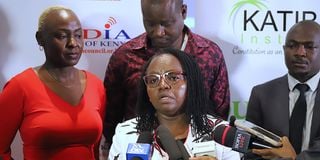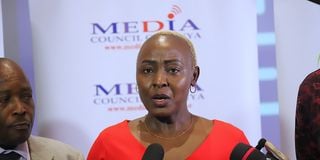Media stakeholders call for fast tracking of cases where Nakuru journalists were assaulted

Media Council of Kenya (MCK) CEO David Omwoyo during an interview on November 3,2025.
Journalists and media stakeholders gathered in Nakuru to commemorate the International Day to End Impunity for Crimes Against Journalists, where they called for urgent accountability and protection for members of the press facing increasing threats both online and offline.
In an interview, Media Council of Kenya (MCK) CEO David Omwoyo revealed that Kenya recorded 95 cases of press freedom violations in 2025, down from 130 cases in 2024.
However, the decline in numbers did not translate to progress, as Kenya’s ranking in the Reporters Without Borders Global Press Freedom Index dropped sharply from position 62 to 116.

Commemoration of the International Day to End Impunity for Crimes Against Journalists, held in Nakuru on November 3,2025.
Omwoyo attributed the fall to the persistent failure to secure convictions for crimes against journalists.
“We had a foreign journalist killed in Magadi and to date no one has been held accountable. That impunity is why we are here today. When perpetrators are not prosecuted or punished, it threatens press freedom and undermines our democracy,” he says.
Several journalists from Nakuru are among those still waiting for justice after being attacked while on duty.
They include Nation Media Group’s Ruth Sarmwei, Royal Media Service’s Evans Asiba and Maryanne Nyambura, who were assaulted by police while covering the National Drama Festival; Standard Group’s Daniel Chege and Media Max’s Catherine Wanjeri, who was shot while reporting during the Gen Z protests.
An MCK report showed a shift in the main perpetrators of press violations.
In 2025, county governments ranked first, up from fourth place in 2024, while police came second, dropping from the top position in last year’s ranking.
Goons and government officials followed in third and fourth positions respectively.
Omwoyo notes that while MCK continues to document and forward cases to authorities such as the ODPP, National Police Service, and IPOA, the lack of follow-through remains a major obstacle.
Kenya Union of Journalists (KUJ) Secretary General Eric Oduor expressed frustration over the continued inaction by state agencies mandated to protect journalists and prosecute perpetrators of press freedom violations.

Kenya Union of Journalists (KUJ) Secretary General Eric Oduor during an interview on November 3,2025.
He noted that while the union and media stakeholders consistently report attacks to authorities, police investigations often stall or are deliberately mishandled, resulting in weak or collapsed cases once they reach court.
“In response to this persistent lack of accountability, the union is working with partners such as the Katiba Institute and has begun pursuing private prosecutions as an alternative route to justice. Privately initiated cases have proven more effective, with several already progressing through the courts,” Oduor says.
Katiba Institute Deputy Executive Director, Christine Kuria, reaffirmed the organization’s commitment to defending media rights through public interest litigation.

Katiba Institute Deputy Executive Director, Christine Kuria during an interview on November 3,2025.
“Freedom of the media and access to information are constitutional guarantees under Articles 34 and 35. You cannot talk about transparency when journalists are under threat,” she says.
Meanwhile, Queenter Mbori, Executive Director of the Association of Media Women in Kenya (AMWIK), highlighted the rising cases of technology-facilitated gender-based violence against women journalists, including cyberbullying and online harassment.

Queenter Mbori, Executive Director of the Association of Media Women in Kenya (AMWIK), during an interview on November 3,2025.
Mbori also called on media houses to strengthen internal policies on safety, mental health, and welfare.


